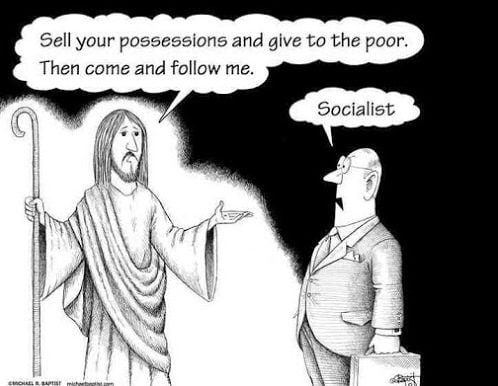
By C.J. Polychroniou, Common Dreams, Used with Permission
If we are to expect the frustrated and badly battered working-class people to turn their backs on the false promises of the far right and join instead the struggle for a more humane order based on socialist ideals and values, we need to take winning hearts and minds much more seriously.
For radical socialists, one of the most frustrating political experiences in the post-Cold War era is witnessing the dramatic deterioration of socio-economic conditions throughout the developed world and, at the same time, the failure of the Left narrative to convince the citizenry about the root causes of the problems at hand and that alternative socio-economic arrangements are in turn urgently needed. This is a paradox that open-minded radical socialists should not be hesitant to confront. A critical examination of the failure of the Left narrative to make inroads with the laboring classes in contemporary capitalist society is a must if the political pendulum is to swing back from conservative control.
The Left has always offered solid critiques about the state of capitalism. Armed with a class-driven perspective (“the history of all hitherto existing society is the history of class struggles”) which has become increasingly complemented by a multi-level analysis that also brings into play the role of race, gender, culture and ethnicity, the Left narrative about the nature of the problems facing contemporary capitalist societies has no equal among politico-economic discourses. It explains economic inequality on the basis of the dynamics of a profit-driven system geared toward serving almost exclusively the interests of the dominant classes instead of treating it as an outcome of individual failures (the right-wing version of economic inequality); understands racism as a force of its own, instead of trying to sweep it under the carpet as the Right does, but also recognizes that it’s continuation in present-day society is a consequence of specific institutional arrangements and both implicit and explicit biases; and advocates a succession of policies that aim toward the attainment of the common good instead of catering to the needs and interests of a tiny coterie of corporate and financial elites as conservative policies tend to do.
The Left narrative is intellectually rigorous but also couched in deeply humanistic terms. Since the French Revolution, the Left worldview has always been one that values the common good over narrowly defined private interests, progress over tradition, democracy over authoritarian rule. As such, it favors cooperation over competition, solidarity over rugged individualism, and science over religion and superstition. It is of little surprise, therefore, that the world’s greatest intellectuals, artists and writers in the modern age — from Victor Hugo to Arturo Toscanini and from Pablo Picasso to Jean Paul Sartre — have been to the left of the political spectrum. Indeed, in a continent where ideas have always been taken very seriously, one of the great grievances among 20th century European conservatives was over the fact that so few artists and intellectuals were to be found to the right of the ideological spectrum.
Nonetheless, no matter how intellectually and morally powerful it may have been, the Left narrative about the brutal realities of the capitalist system and the alternative values that should be guiding societal development was never the dominant political paradigm. The forces of reaction have always been a formidable opponent, relying both on the ideological and repressive apparatuses of the state to block radical change initiatives. From the brutal suppression of the Paris Commune by French and Prussian troops during the “Bloody Week” (21-28 May 1871), where some 30,000 Communards were killed, to the role of the CIA in promoting anticommunism in Europe in the period immediately following the Second World War to today’s strategic co-optation of once radical groups into mainstream political forces (the German Green Party, Syriza in Greece, Podemos in Spain, to name just a few), the powers that be have almost always found ways to create barriers to radical social transformation.
The Left narrative has also been undermined by the experience of “actually existing socialism.” Socialism, as practiced in the former Soviet Union and its satellite states, was undemocratic and had little tolerance for individual liberties and freedoms. The political system in place actually sabotaged the social, cultural, and economic achievements of “actually existing socialism,” which were in fact quite extensive, and it was a key factor in people turning away from embracing socialism as an alternative socio-economic order.
Formed in the periphery of the global capitalist system, where neither economic nor political development had yet to reach capitalist maturity (Russia was largely an agrarian society that had never before experienced democracy when the Bolsheviks took power in 1917), the type of socialism introduced functioned on the basis of the centralization of economic resources and institutions in the hands of the state and on single party governance. Workers had no say in economic decisions even though they were touted as co-owners of the means of production. This form of system became entrenched in the “motherland” of socialism after Stalin became an autocrat (1929-1953) and remained pretty much intact even during the so-called liberalization period that was ushered in by Nikita Khruschev (1956-1964), while even less changed under the leadership of Leonid Brezhnev (1964-1982). In the land of “actually existing socialism,” the rulers possessed no wealth and had no private property of their own but made all the decisions for the rest of society. The USSR was at best a “deformed workers’ state.”
Still, socialist and communist parties in the western world were quite popular with the masses both during the interwar years and for much of the postwar period. Communist parties carried a great deal of influence in trade unions and student movements and socialist parties were in power in numerous European countries after World War II. Indeed, the future did seem to belong to the Left.
All this changed for the worse with the collapse of “actually existing socialism” and the end of the Cold War. Instead of feeling liberated by the collapse of authoritarian state-socialism, the western Left felt a loss of identity and entered a long period of intellectual confusion and political paralysis. Many of its intellectuals abandoned their long-held ideas about socialism and communism and turned instead to mainstream political discourses, while others fell into depression and retreated altogether from political and ideological struggles. Subsequently, postmodern philosophers emerged on the scene who not only challenged the ideals of socialism but, in one of the vilest interventions in the history of intellectual discourse, identified socialism and communism with the crimes of Stalinism. The works of Marx were either ignored or completely distorted. By the mid-1990s, the intellectual paradigm shifted from Marxism and socialism to postmodernism. Media outlets to the very left of the political spectrum saw their readership decline in substantial numbers, and communist parties fell out of favor with intellectuals, workers, and students alike. By the early 2000s, most western communist parties ended up in the dustbin of history while trade unions lost entirely their political character and turned ever more toward economism. The end result was that the vision of socialism suffered a tremendous blow and the Left narrative about capitalism became quite marginalized, having little impact on the laboring populations that were experiencing declining standards of living, growing economic insecurity, and a shrinking social state under the auspices of neoliberalism.
And this is where things still stand today. Socialism remains in deep crisis in the developed world, with the only exception being the United States, the only country in the developed world that doesn’t even have a left-wing political party.
Indeed, in the metropolis of the neoliberal capitalist universe, socialism is enjoying considerable popular support, especially among the youth. For the first time, socialism in the U.S. has ceased being a taboo. Yet, one could argue that some of the political figures most responsible for the rebirth of socialism in the United States (such as Alexandria Ocasio-Cortez and Bernie Sanders) are not socialists per se and that their fight is on behalf of a light version of European social democracy.
To stress this point further, the progressive struggle in the U.S. is over a series of selected economic and social issues (universal healthcare, student debt elimination, unionization, and defending social security and Medicare) when Europe’s postwar left-wing movements and parties, especially from the 1950s through the mid-1980s, were aiming for nothing less than the radical transformation of the entire capitalist system. Social rights such as free higher education and free healthcare had already been realized in western European countries, thus making the struggle for socialism not issue-oriented but a holistic project. For example, demands for the socialization of the means of production were on top of the political agenda of all radical left parties and organizations in western Europe. The French communist party did not shy away from labelling the socialist revolution and the “dictatorship of the proletariat” as its key strategic objectives. Yet, indicative of how sour things have gone for the socialist project since the end of the Cold War, popular forces in many European countries find themselves today fighting for the mere protection of basic social rights as the wrecking ball of neoliberalism is in full swing, seeking to destroy the last vestiges of the social state.
The Left narrative is failing to convince the bulk of the citizenry in today’s western world not because the analyses advanced about the consequences of neoliberal capitalism are incorrect but because the vision of socialism itself rarely enters the equation. Leftist intellectuals shy away from making a case for socialism. Critiques of neoliberal capitalism are not in themselves a case for the radical transformation of capitalism and its eventual replacement with a socialist socio-economic order. Critiques of neoliberal capitalism without the ideological underpinnings of a socialist vision ingrained into the analysis suggest that there is no alternative to capitalism, only a better version of capitalism. And today’s Left narrative is overwhelmed with critiques of neoliberal capitalism, which are of course very much needed, but remain largely silent about the question of a future beyond capitalism.
If we are to expect the frustrated and badly battered working-class people to turn their backs on the false promises of the far right and join instead the struggle for a more humane order based on socialist ideals and values, then the ideological battle for the minds and hearts of the laboring populations must be resumed. The vision of socialism must return in full force to the public arena. Ideological belief systems matter in politics. They are what motivates people into political action.
There are, however, also systemic factors responsible for the failure of the Left narrative to convince the laboring population in the developed countries. On the one hand, the ideological apparatuses of late capitalism have elevated the art of political apathy to such great heights that they have succeeded in making an increasingly large segment of the citizenry feel totally helpless about the possibility of making a meaningful change through participation in political struggles. At the same time, they are creating the illusion that success and failure are a matter of character, and that self-realization can be attained based on the pursuit of purely self-centered activities rather than through engagement with other human beings in common struggles for a better future for all. Whether it is the entertainment industry or marketing strategies for consumers, the prevailing mode of reference is the “self,” the individual as an isolated unit with “unique” experiences. Social injustices are virtually never brought into light by the system’s ideological apparatuses, including public education which acts under capitalism as a mechanism for creating social consensus around mainstream values and beliefs. The corporatization of higher education, with its overwhelming emphasis on market skills instead of critical pedagogy for the betterment of society and the enhancement of the democratic ethos, has also contributed immensely to the politics of apolitical culture.
On the other hand, the political agencies and the cultural institutions that are needed for the enhancement of working-class consciousness and for activating the Left narrative into action have been extensively weakened and, in some cases, even become extinct. As stated earlier, communist parties in western Europe are mostly gone while their socialist counterparts have moved so far to the right that they are now virtually indistinguishable from Christian Democratic and conservative parties in general. As for today’s radical left parties, they are anything but radical and reflect the ideological confusion that is the hallmark of multiculturalism and the politics of identity. In sum, the working classes in the developed world find themselves today without mass-based political parties that represent the interests of labor. Little wonder then why working-class people are drawn to the far-right as the leaders of those parties claim to be fighting for the primacy of workers’ interests.
Until a few decades ago, the working-class people throughout the developed world could not only rely on mass parties representing specifically their own interests but also had their own cultural institutions whose mission was to foster ideological awareness and forge proletarian culture. Socialist and communist newspapers made an immense contribution to working-class consciousness and raised the level of radicalism. Trade unions performed an equally important role by organizing various educational and social activities that enhanced solidarity. With the collapse of “actually existing socialism” and the onset of a socialist crisis, all working-class institutions experienced a dramatic fallout. In Italy, l’Unità, which had been founded by Antonio Gramsci and was the official newspaper of the Italian Communist Party, went under. In France, the venerable L’Humanité has been struggling for years with financial woes and low circulation. As for workers’ clubs, they are a thing of the past.
In conclusion, the Left narrative, no matter how accurate and intellectually powerful it may be, cannot expect to catch the imagination of the citizenry without including a vision for a real alternative future. Moreover, working-class cultural institutions need to be reinstituted for the enhancement of class consciousness and authentic socialist parties need to be rediscovered for the Left narrative to become politically effective. Social movements are important, but their actions rarely have lasting effects. Only political parties can succeed in forging the Left narrative into the policy agenda and turn it into a programmatic plan for radical social change. Understandably enough, this is quite a tall order, but the Left needs to win once again the hearts and minds of the laboring classes. But it needs the necessary political agencies and cultural instruments to do so. It cannot accomplish it on intellectual grounds alone, especially with the politics of identity acting as a spearhead for social transformation. The Communist Manifesto would have remained just a mere political document if it wasn’t for the existence of radical political parties across the globe to embrace it as their guide and vision for the emancipation of the working class from the yoke of capital.
In conclusion, the Left narrative, no matter how accurate and intellectually powerful it may be, cannot expect to catch the imagination of the citizenry without including a vision for a real alternative future. Moreover, working-class cultural institutions need to be reinstituted for the enhancement of class consciousness and authentic socialist parties need to be rediscovered for the Left narrative to become politically effective. Social movements are important, but their actions rarely have lasting effects. Only political parties can succeed in forging the Left narrative into the policy agenda and turn it into a programmatic plan for radical social change. Understandably enough, this is quite a tall order, but the Left needs to win once again the hearts and minds of the laboring classes. But it needs the necessary political agencies and cultural instruments to do so. It cannot accomplish it on intellectual grounds alone, especially with the politics of identity acting as a spearhead for social transformation. The Communist Manifesto would have remained just a mere political document if it wasn’t for the existence of radical political parties across the globe to embrace it as their guide and vision for the emancipation of the working class from the yoke of capital
The Left has always offered solid critiques about the state of capitalism. Armed with a class-driven perspective (“the history of all hitherto existing society is the history of class struggles”) which has become increasingly complemented by a multi-level analysis that also brings into play the role of race, gender, culture and ethnicity, the Left narrative about the nature of the problems facing contemporary capitalist societies has no equal among politico-economic discourses. It explains economic inequality on the basis of the dynamics of a profit-driven system geared toward serving almost exclusively the interests of the dominant classes instead of treating it as an outcome of individual failures (the right-wing version of economic inequality); understands racism as a force of its own, instead of trying to sweep it under the carpet as the Right does, but also recognizes that it’s continuation in present-day society is a consequence of specific institutional arrangements and both implicit and explicit biases; and advocates a succession of policies that aim toward the attainment of the common good instead of catering to the needs and interests of a tiny coterie of corporate and financial elites as conservative policies tend to do.
Bruce Gerencser, 68, lives in rural Northwest Ohio with his wife of 47 years. He and his wife have six grown children and sixteen grandchildren. Bruce pastored Evangelical churches for twenty-five years in Ohio, Texas, and Michigan. Bruce left the ministry in 2005, and in 2008 he left Christianity. Bruce is now a humanist and an atheist.
Your comments are welcome and appreciated. All first-time comments are moderated. Please read the commenting rules before commenting.
You can email Bruce via the Contact Form.





